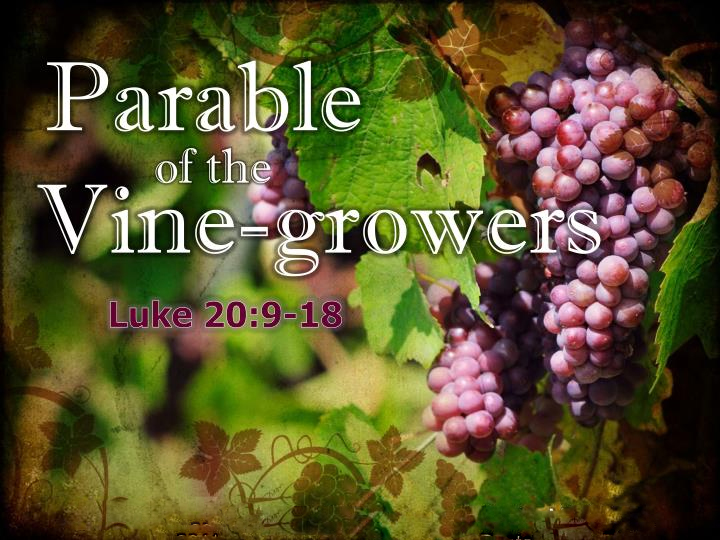 LUKE 20:9-26. In response to the questioning of His authority by the scribes and Pharisees after His cleansing of the Temple, Jesus tells a parable. This parable summaries the whole of biblical history including the gospel. God sends servant after servant but the tenants refuse to hand over the fruit of the vineyard. Finally the son is sent and He is murdered. This outrage demands the punishment of the tenants and the transfer of the vineyard to others. A parable about a vine and vineyard was not new for Israelites. The vineyard was a familiar image of God’s investment and expectation of return from His people (Isa. 5:1-7; Ezek. 15:1-6; 19:10-14). Isaiah had used the figure to refer to the nation (Isa. 5:1-7), and the symbolism would have been clear to the hearers (Ps. 80:8-13; Isa. 27:2; Jer. 2:21). The parable also reflects the events that will unfold during this final week of Jesus’ earthly life.
LUKE 20:9-26. In response to the questioning of His authority by the scribes and Pharisees after His cleansing of the Temple, Jesus tells a parable. This parable summaries the whole of biblical history including the gospel. God sends servant after servant but the tenants refuse to hand over the fruit of the vineyard. Finally the son is sent and He is murdered. This outrage demands the punishment of the tenants and the transfer of the vineyard to others. A parable about a vine and vineyard was not new for Israelites. The vineyard was a familiar image of God’s investment and expectation of return from His people (Isa. 5:1-7; Ezek. 15:1-6; 19:10-14). Isaiah had used the figure to refer to the nation (Isa. 5:1-7), and the symbolism would have been clear to the hearers (Ps. 80:8-13; Isa. 27:2; Jer. 2:21). The parable also reflects the events that will unfold during this final week of Jesus’ earthly life.
Jesus opens the story in verse 9 by referring the historically rich imagery of a vineyard. “And He began to tell the people this parable: “A man planted a vineyard and rented it out to vine-growers, and went on a journey for a long time. The story was based on a common practice of landowners hiring out their land to tenant farmers. The owner of the land rented out his property to tenants who were to give him an agreed upon portion of his property’s yield. The vineyard owner then takes distant journey for a long time. He waited for the vineyard to produce its fruit.
Verse 10 reveals the outcome of the owners request for his portion of the land’s production. “At the harvest time he sent a slave to the vine-growers, so that they would give him some of the produce of the vineyard; but the vine-growers beat him and sent him away empty-handed. At harvest those who tended the vine would get a certain share of the crop and the owner would get another portion. The servant went to gather that portion. He went to speak the words of the owner. The return was fair and what they agreed on. But the property’s tenants revolted refusing to pay the owner’s share of the income then even mistreated his servant or messenger. This shows God and Israel’s covenant relationship. God blessed the nation of Israel abundantly and invested them with great productive potential. All He asked was that they obey His Word and return to Him a spiritual harvest out of their lives. Instead of being grateful for their blessing and joyfully returning to the Lord His due, they proceeded to rob God and reject His messengers
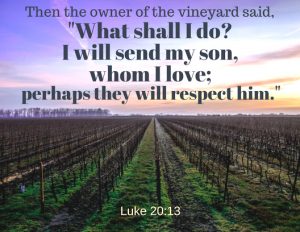 Our noble and enduring God continued to send servant after servant to them as verse 11 depicts. “And he proceeded to send another slave; and they beat him also and treated him shamefully and sent him away empty-handed. Jesus compared the prophets to a series of servants sent to collect fruit from the vineyard. They were rejected, beaten and treated shamefully. Never did these servants illicit the payment due for God’s provision. The amazingly long-suffering owner continues to send more servants as verse 12 indicates. “And he proceeded to send a third; and this one also they wounded and cast out. The first messenger was beaten. The second messenger was not only beaten but also treated shamefully. The third messenger was permanently wounded. What would be the vineyard’s owner’s response to these ungrateful tenants? In verse 13 the vineyard owner, who represents the Lord God, decides to send them His beloved son hoping the tenants would respect him. “The owner of the vineyard said, ‘What shall I do? I will send my beloved son; perhaps they will respect him.’
Our noble and enduring God continued to send servant after servant to them as verse 11 depicts. “And he proceeded to send another slave; and they beat him also and treated him shamefully and sent him away empty-handed. Jesus compared the prophets to a series of servants sent to collect fruit from the vineyard. They were rejected, beaten and treated shamefully. Never did these servants illicit the payment due for God’s provision. The amazingly long-suffering owner continues to send more servants as verse 12 indicates. “And he proceeded to send a third; and this one also they wounded and cast out. The first messenger was beaten. The second messenger was not only beaten but also treated shamefully. The third messenger was permanently wounded. What would be the vineyard’s owner’s response to these ungrateful tenants? In verse 13 the vineyard owner, who represents the Lord God, decides to send them His beloved son hoping the tenants would respect him. “The owner of the vineyard said, ‘What shall I do? I will send my beloved son; perhaps they will respect him.’
We can see here God’s willingness to make Himself totally vulnerable by sending His Son in order to win His people back to Himself. Sin though has a way of making people blind, proud and disrespectful, even to the most loving, most humble, and most holy person or action.Verse 14 reveals the plot to murder the landowner’s Son and take the vineyard by force. “But when the vine-growers saw him, they reasoned with one another, saying, ‘This is the heir; let us kill him so that the inheritance will be ours.’ In this statement Jesus was saying, “I know your plan. I know your intention. I know what’s going on in your hearts.” I believe He didn’t say this to indict them, but to plead with them. The depiction of their usurping His rightful place asks them to rethink their plan saying, “Is there any of you who want to change your mind, to change your direction, to repent?” That’s exactly what the Lord does with us. None of us falls into sin, but rather we walk into sin one step at a time. Yet, as He sent His servants in this parable and His prophets in the Old Testament, the Lord is faithful to send messengers and warnings to us. All too often, however, we continue on a downward path toward destruction. The blindness and depth of our sin will even cause us to make the Son of God dead to us, and experience no remorse for putting God out of our life so we can do what we want to with it.
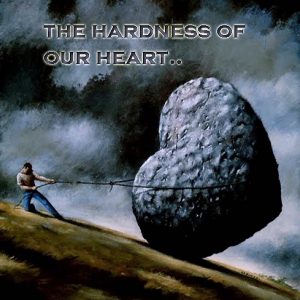 Verse 15 reveals the ultimate result of hardness of the man’s heart against the rule of God. “So they threw him out of the vineyard and killed him. What, then, will the owner of the vineyard do to them? The rejection of the message and the messengers is harsher each time. Ultimately, instead of repenting, they do the very opposite. The rebellious tenants killed the beloved Son, foreshadowing the fate that awaits Jesus in Jerusalem. The son is killed outside the vineyard or camp (Heb. 13:12-13) [an adjustment in Isaiah’s story (Isaiah 5:1-7) to fit the son to Jesus].
Verse 15 reveals the ultimate result of hardness of the man’s heart against the rule of God. “So they threw him out of the vineyard and killed him. What, then, will the owner of the vineyard do to them? The rejection of the message and the messengers is harsher each time. Ultimately, instead of repenting, they do the very opposite. The rebellious tenants killed the beloved Son, foreshadowing the fate that awaits Jesus in Jerusalem. The son is killed outside the vineyard or camp (Heb. 13:12-13) [an adjustment in Isaiah’s story (Isaiah 5:1-7) to fit the son to Jesus].
Jesus then asked his listeners a rhetorical question in the last part of verse 15. “What then will the owner of the vineyard do to them?” The tenants had no respect for the beloved Son of the owner and no remorse for killing Him in an attempt to rid themselves of His rightful claims upon them.In verse 16 Jesus answered His own question. “He will come and destroy these vine-growers and will give the vineyard to others.” When they heard it, they said, “May it never be!”
In judgment for killing His Son, God will “destroy those tenant farmers” and find more worthy tenants to care for His vineyard.Again, the vineyard was a familiar image of God’s investment and expectation of return from His people (Isa. 5:1-7; Ezek. 15:1-6; 19:10-14). These people understood the implication and were thus stunned at the word of final punishment on the tenants (Jewish leaders), sensing that they too will fall with the nation as God gives the vineyard over to Gentiles.
Jesus’ words of prophecy were yet another opportunity, another invitation for the Jewish leaders to repent. He was pleading with them to turn to God in truth and save not only their own lives, but the life of their nation. What was their answer? A tragically unrepentant, “God forbid”.The crowd’s strong responds of no never indicates that they understood the implications of what Jesus was saying: the Jewish system was being set aside because the religious leaders were rejecting Him and the people were following their leadership instead of God. This parable culminates all of Jesus’ messages concerning the fact that Gentiles and outcasts would be added to the kingdom whereas most of Israel would not enter into the kingdom of God because they would not bow their life before Jesus and His authority.
Luke 20:17-18 reference a quotation of Psalm 118:22 and give an interpretation of God’s purpose for His stone of offense. Though Jesus may be rejected by man He is God’s [place of] key to repentance and judgment. Verse 17 sums up the lessons Jesus has been teaching. “But Jesus looked at them and said, “What then is this that is written: ‘The st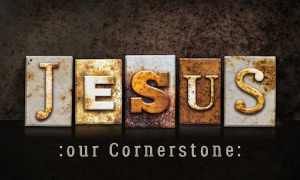 one which the builders rejected, This became the chief corner STONE’? Luke pointed out the seriousness of the situation by recording that Jesus looked directly at them when He quoted the Scripture. ‘The stone which the builders rejected, This became the chief corner STONE’. Psalm 118:22 is a verse which noted that a seemingly insignificant thing (a stone thrown away by stone masons) was really the most important thing (this stone became the capstone). Jesus’ point was that He, the most important element in the Jewish nation, was being rejected, but ultimately would be supreme.
one which the builders rejected, This became the chief corner STONE’? Luke pointed out the seriousness of the situation by recording that Jesus looked directly at them when He quoted the Scripture. ‘The stone which the builders rejected, This became the chief corner STONE’. Psalm 118:22 is a verse which noted that a seemingly insignificant thing (a stone thrown away by stone masons) was really the most important thing (this stone became the capstone). Jesus’ point was that He, the most important element in the Jewish nation, was being rejected, but ultimately would be supreme.
Psalm 118 is a messianic Psalm [particularly 118:1-28] that had just been shouted when Jesus triumphantly rode into Jerusalem (Luke19:38). Psalm 118:22 is the most often quoted Old Testament verse in the New Testament. It refers to the construction of the temple under Solomon’s reign when the massive stones were chiseled miles away from the building site in order that no sound be heard upon the temple mount. When the stones arrived, one stone didn’t fit and was thrown down the hill into the Kidron Valley. When it became evident that the cornerstone was missing, the stone that had been rejected turned out to be the one that fit perfectly. Jesus applies this to Himself. “You’re trying to build your salvation apart from Me,” He says, “but you’re going to see that I am the Cornerstone. Without Me, nothing stands.”
Jesus is the stone which does not fit the preconceived notion of the messiah. His resurrection from the dead though proves that He is the one upon Whom all eternity is built. Though the leaders of the political world and the religious world may reject Jesus, God has made Him the centerpiece of His plan. Though people, even all people reject Him and refuse to build their life upon Him and His Word, there is no replacement of or for God’s precious and chosen corner Stone. The corner stone or foundational stone was place at the corner of the building. It bore the weight of the walls that intersected at that corner and gave direction to where those walls were built. It could be said that it shaped and supported the building.
Verse 18 states that those who will not fall upon this stone in the brokenness of repentance will have that stone fall upon them in judgment. “Everyone who falls on that stone will be broken to pieces; but on whomever it falls, it will scatter him like dust.” Jesus is the means of repentance and judgment. To fall 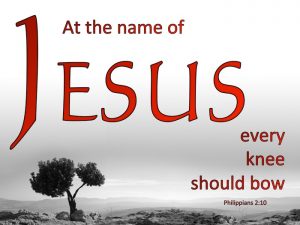 upon that stone is to have your life broken to pieces. This brokenness of life that comes by judging yourself and casting your life upon His mercy is the way of salvation and restoration. The one who falls upon Jesus the Cornerstone will indeed be broken, for it is only in admitting our sin and our need that we can be saved.Rejecting God’s beloved Son by failing to cast your life upon Him has grave consequences. You see, those who aren’t broken before Him will one day be broken by Him. Every knee shall bow and every tongue will confess that Jesus is Lord (Philippians 2:10).
upon that stone is to have your life broken to pieces. This brokenness of life that comes by judging yourself and casting your life upon His mercy is the way of salvation and restoration. The one who falls upon Jesus the Cornerstone will indeed be broken, for it is only in admitting our sin and our need that we can be saved.Rejecting God’s beloved Son by failing to cast your life upon Him has grave consequences. You see, those who aren’t broken before Him will one day be broken by Him. Every knee shall bow and every tongue will confess that Jesus is Lord (Philippians 2:10).
The only question is when will your life be broken by God’s precious chosen stone? Will you cast your life upon Him now to be broken before Him in repentance and be saved? Or will you wait too long and be broken or crushed by Him when He returns to judge the world?
The story of the wicked vinedressers is an analogy about Israel to whom God gave life and land that they might go and bear fruit. God now wants spiritual fruit, and they cannot produce it. Jesus is telling them that God requires fruits of righteousness and new life, the fruits of love, joy, and peace. He reminds them they have killed the prophets and servants sent to collect God’s fruits and they will even kill His Son and Heir. They readily denied it was true.The eyes of the people were blinded. They were spurning the authority of Christ and His Word. In a few days they would even reject God’s love as they cried for Jesus’ crucifixion on the cross. But even there where God’s judgment fell upon sin He would make a way out for His rebellious people. For the judgment of God that fell upon His Beloved Son was for us. He died in our place to take away our sins. Jesus’ was broken and shaped in judgment that He might become the cornerstone of a new life built upon God’s will and way.
Peter writes, “For in Scripture it says: ’See I lay a stone in Zion, a chosen and precious cornerstone, and the one who trusts in Him will never be put to shame” (1 Peter 2:6). There are all kinds of advice around us, all kinds of experts. The only true and trustworthy expert is Christ. He gives us the absolute certain truth recorded for us written in Scripture. If we repent and fall upon Christ as the new cornerstone of life, our life will be broken in pieces but as we trust and live for Him we can rebuild it upon the chosen cornerstone of eternal existence. If we fall upon Him and build our life upon Him, we will never, ever put to shame. If you have never cast your life in repentance before Him, Jesus calls upon you to do so right now. It’s never to early to begin to build a life based and built upon Christ Jesus. You come if His Spirit leads.Jesus is also speaking to a basic problem in the church. To whom does the vineyard belong? Does all its activities and laborers belong to the people, be they church officers or bishops or even the Pope? No, the vineyard belongs to the One who planted it. We tend to forget that and act as if it belongs to us or our particular faction.
Luke 20:20-26
 Someone once said, “While there are just two certainties in life: death and taxes, at least death doesn’t get worse every time Congress is in session!” “A man on vacation was strolling along outside his hotel in Acapulco, enjoying the sunny Mexican weather. Suddenly, he was attracted by the screams of a woman kneeling in front of a child. The man knew enough Spanish to determine that the boy had swallowed a coin. Seizing the child by the heels, the man held him up, gave him a few shakes, and an American quarter dropped to the sidewalk. “Oh, thank you sir!” cried the woman. “You seemed to know just how to get it out of him. Are you a doctor?” “No, ma’am,” replied the man. “I’m with the United States Internal Revenue Service.” Having to pay taxes has never been popular. Taxes are not a voluntary contribution. To fail to pay one’s taxes, or to pay less than one should is a sure way to get the attention of the government, and to discover just how strong they feel about our payment of taxes. The payment of taxes is a very pragmatic matter, for governments do not run without money, tax money. But paying one’s taxes is also a symbolic act, evidencing his or her submission to the one that is paid. Paying taxes is thus a practical acknowledgment of that government’s right to rule over us, and of our submission to its authority.
Someone once said, “While there are just two certainties in life: death and taxes, at least death doesn’t get worse every time Congress is in session!” “A man on vacation was strolling along outside his hotel in Acapulco, enjoying the sunny Mexican weather. Suddenly, he was attracted by the screams of a woman kneeling in front of a child. The man knew enough Spanish to determine that the boy had swallowed a coin. Seizing the child by the heels, the man held him up, gave him a few shakes, and an American quarter dropped to the sidewalk. “Oh, thank you sir!” cried the woman. “You seemed to know just how to get it out of him. Are you a doctor?” “No, ma’am,” replied the man. “I’m with the United States Internal Revenue Service.” Having to pay taxes has never been popular. Taxes are not a voluntary contribution. To fail to pay one’s taxes, or to pay less than one should is a sure way to get the attention of the government, and to discover just how strong they feel about our payment of taxes. The payment of taxes is a very pragmatic matter, for governments do not run without money, tax money. But paying one’s taxes is also a symbolic act, evidencing his or her submission to the one that is paid. Paying taxes is thus a practical acknowledgment of that government’s right to rule over us, and of our submission to its authority.
Remember the old saying, “politics makes strange bedfellows,” well that is certainly the case in Luke 20. Jesus had answered the challenge of the Jewish leadership about his authority to cleanse the temple and teach in the temple (v. 2), first with an embarrassing question concerning where John the Baptist got his authority (v. 3) and then with a parable (vv. 9-16). According to verse nineteen they were so infuriated that they would have arrested Jesus on the spot had; they not been hindered by the crowd in the temple. They decided then and there to trap Jesus somehow into condemning himself with his own words. Verse twenty reveals, “So they watched Him, and sent spies who pretended to be righteous, that they might seize on His words, in order to deliver Him to the power and the authority of the governor.”The 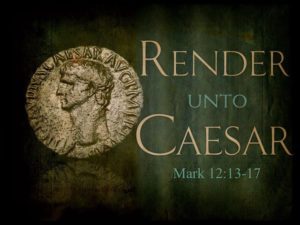 religious leadership of Israel formed a conspiracy against Jesus, according to Mark 12:13 it was the Herodians and the Pharisees who formed a coalition. There could hardly be a more unlikely partnership. “The Pharisees represented cautious resistance to Rome, the Herodians wholesale accommodation. But they were cemented together by their mutual hatred for Jesus. The Pharisees hated him because he was disrupting their religious agenda, the Herodians because he threatened their political arrange-ments”
religious leadership of Israel formed a conspiracy against Jesus, according to Mark 12:13 it was the Herodians and the Pharisees who formed a coalition. There could hardly be a more unlikely partnership. “The Pharisees represented cautious resistance to Rome, the Herodians wholesale accommodation. But they were cemented together by their mutual hatred for Jesus. The Pharisees hated him because he was disrupting their religious agenda, the Herodians because he threatened their political arrange-ments”
In verse twenty-one we read, “Then they asked Him, saying, “Teacher, we know that You say and teach rightly, and You do not show personal favoritism, but teach the way of God in truth:” When they came to Him, they came with a deceitful flattery. They no more believed that Jesus “taught the way of God in truth” than they believed the moon was made of cheese. Flattery is the reverse mirror-image of gossip. “Gossip involves saying behind a person’s back what you would never say to his face. Flattery is saying to a person’s face what you would say behind his back.” ~Kent Hughes
After these spies thought they had laid the ground work with sufficient flattery, they posed their question in verse twenty-two, “Is it lawful for us to pay taxes to Caesar or not?” In this passage Jesus teaches two profoundly important truths.First, Jesus Taught The Believer’s Obligations To the State. Luke 20:23-25 Jesus was not fooled by them or taken in by their flattery. He looked beyond their hypocrisy and saw their evil intent. Verse twenty-three, “But He perceived their craftiness, and said to them, “Why do you test Me? (24) Show Me a denarius. Whose image and inscription does it have?” They answered and said, “Caesar’s.”Jesus asked these religious leaders for a coin, but he specifically asked them for a Denarius. The Denarius was a small silver coin that had the value of one day’s wages. The r eason that Jesus asks for the Denarius is more evident in Matthew’s account (22:19), “Show me the coin used for paying the tax?” You can almost see one of the men without thinking reach into his robe and pull out one of these little silver coins. I think there is a touch of humor in this. He first of all embarrassed his challengers in that it is they not he who are carrying the offensive coin. In using the coinage they had tacitly accepted Caesar’s rule.He then asked them. Who owns this coin? Who gives value to it? Who did you get it from? Who’s image in on this coin? The answer of course was Caesar. And then Jesus said in verse twenty-five, “Render therefore to Caesar the things that are Caesar’s, and to God the things that are God’s.”
eason that Jesus asks for the Denarius is more evident in Matthew’s account (22:19), “Show me the coin used for paying the tax?” You can almost see one of the men without thinking reach into his robe and pull out one of these little silver coins. I think there is a touch of humor in this. He first of all embarrassed his challengers in that it is they not he who are carrying the offensive coin. In using the coinage they had tacitly accepted Caesar’s rule.He then asked them. Who owns this coin? Who gives value to it? Who did you get it from? Who’s image in on this coin? The answer of course was Caesar. And then Jesus said in verse twenty-five, “Render therefore to Caesar the things that are Caesar’s, and to God the things that are God’s.”
Jesus tells them, “This is really not that complicated, give back to the one you got it from. It’s not yours. It was provided for your use, but it really belongs to Caesar. So give it back. It’s that simple” I think that Jesus is also recognizing something important here. These Jews benefited from Roman rule, they used the system of Roman roads, and the peace that came with along with the Roman army. Jesus is saying that those who enjoy Caesar’s benefits should pay Caesar’s taxes.What do we owe human government? Is there an obligation there? Jesus says there is!
A Christian’s civic duties can be wrapped up into just three things.
- Pay – God calls on us as Christians to be good citizens. We need to pay our taxes, we enjoy the benefits, we should pay our share.
- Pray (1 Tim 2:1-2) “Therefore I exhort first of all that supplications, prayers, intercessions, and giving of thanks be made for all men, 2for kings and all who are in authority, that we may lead a quiet and peaceable life in all godliness and reverence.”
- Obey. In Romans 13:1-7, Paul expands on the words of Jesus, this teaching is so important that it has helped to shape the world as we know it today. Paul sets out the general principle in verse one of Romans 13 when he says, “Let every soul be subject to the governing authorities. For there is no authority except from God, and the authorities that exist are appointed by God.” In these verses Paul tells us that we are to submit to human government, so long as they do not try to cause us to violate the Word of God. God has placed governments on the earth to restrain sin until He comes. We are to obey government, not as an enemy of God, but as the agent of God.
Secondly, Jesus Taught the Believer’s Obligations to God (v. 25)
But just as the denarius was Caesar’s coinage, Man is God’s coinage. The coin belonged to Caesar because it bore his image, and we are God’s because we bear his image. Genesis 1:27 says, “So God created man in his own image, in the image of God he created him: male and female he created them.” Because we bear His image we then owe God what belongs to him; our lives and our allegiance. The Greek word for image here is (eikon) it is the same word used in the Greek translation of the Old Testament (Septuagint) when it translates the verse from Genesis that I just read to you telling the story of how God created man in His own image. We are literally the eikon of God.
Look once again at what Jesus said in verse 25, “Render to Caesar the things that are Caesar’s, and to God the things that are God’s.” I want to close by asking you. What do you have today that belongs to God? Are you holding on to your time? Do you really think it’s yours? Perhaps God is saying to you today, “I want time with you. I want to know you personally, intimately.” Perhaps God is calling you to make a commitment this day to faithfully block out time for Him daily. Are you holding on to God’s tithe, mistakenly thinking that it’s not  really His, but yours? Are you robbing God? That’s what Micah the prophet calls it (Micah 3:8). Perhaps He is speaking to your heart today, calling you to give up what doesn’t belong to you, but belongs to Him. He only does so in order to bless you. God has promised to pour out an abundant blessing upon those who obey Him in the matter of the tithe. Obey Him today. Perhaps you’re holding on to the talents and abilities God has given you. Perhaps you’re sitting back, unwilling to really get involved, unwilling to really commit to participate fully in the life of the church. Perhaps the Lord is speaking to you today to get involved, to get committed, to report for duty. If God is speaking to you about what you owe Him, be obedient today. Bring your account up to date. It is our duty to do so.Verse twenty-six gives us how this confrontation ended, “But they could not catch Him in His words in the presence of the people. And they marveled at His answer and kept silent.”When they could not refute what he had said they went away in silence.
really His, but yours? Are you robbing God? That’s what Micah the prophet calls it (Micah 3:8). Perhaps He is speaking to your heart today, calling you to give up what doesn’t belong to you, but belongs to Him. He only does so in order to bless you. God has promised to pour out an abundant blessing upon those who obey Him in the matter of the tithe. Obey Him today. Perhaps you’re holding on to the talents and abilities God has given you. Perhaps you’re sitting back, unwilling to really get involved, unwilling to really commit to participate fully in the life of the church. Perhaps the Lord is speaking to you today to get involved, to get committed, to report for duty. If God is speaking to you about what you owe Him, be obedient today. Bring your account up to date. It is our duty to do so.Verse twenty-six gives us how this confrontation ended, “But they could not catch Him in His words in the presence of the people. And they marveled at His answer and kept silent.”When they could not refute what he had said they went away in silence.
Let’s pray – Lord God give us the courage and strength today to step into Your will for us. Help us to let go of those things we see as ours for they are Yours. Help each one of us to say “Lord here I am, use me.” Lord I thank you for all that you do in our lives. Lord bless us and keep us. May your face shine on us. May the Lord lift up His countenance on us and give us peace. Amen.
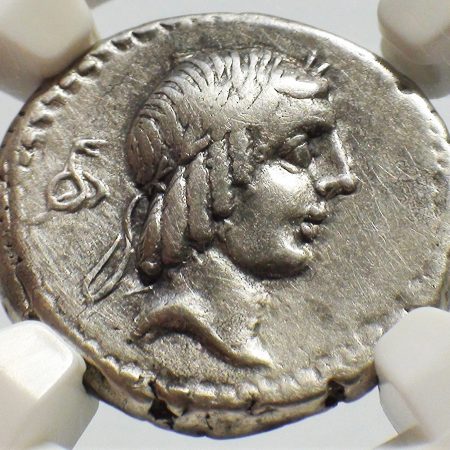
0 Comments